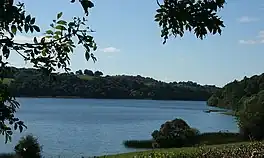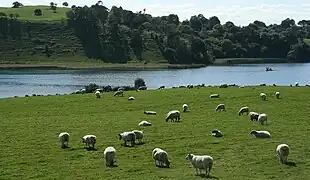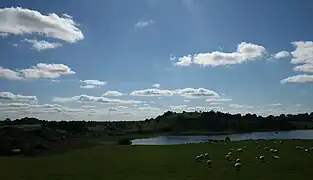Lough Bane
Lough Bane (Irish: An Loch Bán)[2] is a lake on the border of County Meath and County Westmeath in Ireland. The county border runs east–west through the centre of the lake.[3]
| Lough Bane | |
|---|---|
 | |
 Location in Ireland | |
| Location | County Meath and County Westmeath |
| Coordinates | 53°41′20″N 7°10′20″W |
| Type | Glacial lake |
| Native name | An Loch Bán (Irish) |
| Primary outflows | River Deel |
| Catchment area | 4.7 km2 (1.8 sq mi) |
| Basin countries | Ireland |
| Surface area | 0.75 km2 (0.29 sq mi) |
| Max. depth | 16 m (52 ft) |
| Surface elevation | 112 m (367 ft) |
| References | [1] |
Lough Bane forms part of the Lough Bane and Lough Glass Special Area of Conservation. The lake is the largest of three lakes in the SAC, the others being Lough Glass and Lough Glass North. Lough Bane is located about 10 km (6 mi) from Oldcastle, County Meath.[4]
Hydrology
Lough Bane is part of the River Boyne catchment. The lake flows out to the River Deel at the lake's southeastern end. The maximum lake depth is 16 m (52 ft).[5] The lake is oligotrophic but considered vulnerable to pollution due to being surrounded by pasture land in a valley location.[4]
Lough Bane supplies water to the towns of Kells and Oldcastle. As of 2018, the Lough Bane water treatment plant supplied 2,500,000 litres (550,000 imp gal; 660,000 US gal) of water per day. A 2018 drought led to the lake recording its lowest level in over 30 years.[6] Falling water levels have exposed marl layers on the lake shore.[4]
Natural history
Fish species in Lough Bane include perch, brown trout, rainbow trout, pike, nine-spined stickleback and the critically endangered European eel. Perch are the dominant fish species. Both trout species are stocked by the Lough Bane Angling Association. A population of white-clawed crayfish was declared extinct at the lake in 1986.[5] Bird life at Lough Bane includes little grebe, cormorant, lapwing, curlew and snipe.[4]
The lake waters host a number of stonewort algae species: Chara rudis, Chara curta, Chara globularis and Chara contraria. Such healthy Chara ecosystems are increasingly rare. Shoreline vegetation includes the wetland species common club-rush, devil's-bit scabious, meadow thistle and meadowsweet. Shoreline tree species include beech, holly and hazel.[4]
Gallery
 View from County Meath
View from County Meath Looking east on Lough Bane
Looking east on Lough Bane
See also
References
- "A Reference Based Typology and Ecological Assessment System for Irish Lakes" (PDF). Environmental Protection Agency (Ireland). 2006. p. 16. Retrieved 27 March 2020.
- "An Loch Bán/Lough Bane". Placenames Database of Ireland (logainm.ie). Department of Culture, Heritage and the Gaeltacht and Dublin City University. Retrieved 26 March 2020.
- Google (27 March 2020). "Lough Bane" (Map). Google Maps. Google. Retrieved 27 March 2020.
- "Lough Bane and Lough Glass SAC". National Parks and Wildlife Service (Ireland). 2013. Retrieved 27 March 2020.
- "Fish Stock Survey of Lough Bane" (PDF). Inland Fisheries Ireland. July 2016. Retrieved 27 March 2020.
- Melia, Paul (26 January 2019). "Water supply for 70,000 still 'below normal' after drought". Irish Independent. Retrieved 27 March 2020.